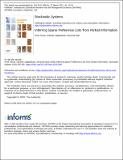Inferring Sparse Preference Lists from Partial Information
Author(s)
Farias, Vivek; Jagabathula, Srikanth; Shah, Devavrat
DownloadPublished version (903.3Kb)
Publisher with Creative Commons License
Publisher with Creative Commons License
Creative Commons Attribution
Terms of use
Metadata
Show full item recordAbstract
© 2020 The Author(s). Probability distributions over rankings are crucial for the modeling and design of a wide range of practical systems. In this work, we pursue a nonparametric approach that seeks to learn a distribution over rankings (aka the ranking model) that is consistent with the observed data and has the sparsest possible support (i.e., the smallest number of rankings with nonzero probability mass). We focus on first-order marginal data, which comprise information on the probability that item i is ranked at position j, for all possible item and position pairs. The observed data may be noisy. Finding the sparsest approximation requires brute force search in the worst case. To address this issue, we restrict our search to, what we dub, the signature family, and show that the sparsest model within the signature family can be found computationally efficiently compared with the brute force approach. We then establish that the signature family provides good approximations to popular ranking model classes, such as the multinomial logit and the exponential family classes, with support size that is small relative to the dimension of the observed data. We test our methods on two data sets: the ranked election data set from the American Psychological Association and the preference ordering data on 10 different sushi varieties.
Date issued
2020Department
Sloan School of Management; Massachusetts Institute of Technology. Department of Electrical Engineering and Computer ScienceJournal
Stochastic Systems
Publisher
Institute for Operations Research and the Management Sciences (INFORMS)